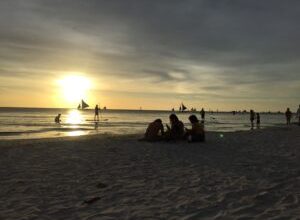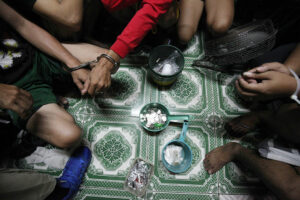Maintaining protocols

My family and I have not traveled locally or abroad in the last two years except for occasional drives up to Tagaytay City, and most recently, to Baguio City. And in going to these destinations by private car, we have had to follow existing protocols. In going to Baguio City, in particular, prior registration online was required.
I encourage territories like Baguio City to maintain existing protocols for tourists and visitors, even under Alert Level 1, but to improve the process to make it more efficient and safer for travelers. The present system of registering online and getting flagged down at road checkpoints, and undergoing triage upon arrival, is painstakingly slow and can be improved by technology.
Last weekend, a long weekend since Feb. 25 was a holiday, Baguio reportedly registered the most numbers of tourist arrivals to the city since the start of the pandemic two years ago. The estimate is 25,000 visitors for the period Feb. 25-27. The city is reportedly looking into capping the daily tourist arrivals at 20,000.
The logic behind this is that while the city coped with 25,000, it can better manage human and vehicular traffic with a daily cap of 20,000. Moreover, with Baguio now under Alert Level 1, the tourist population is expected to increase, and possibly the number of COVID-19 cases as well. A cap of 20,000 arrivals daily is seen as a way to allow the city to better manage the situation.
According to the city’s Public Information Office, establishments can still impose requirements on customers such as the presentation of vaccination cards; tourists will still be required to register online prior to travel; entry protocols will be maintained; and triage guidelines will be modified to avoid long queues at checkpoints and at triage areas.
Decades ago, in the 1950s, I was told that tourists and visitors to Baguio City were actually required to register with the local police upon arrival, and then to “check out” with authorities as they left. Somehow, this requirement eventually disappeared. It is only now, with the COVID-19 pandemic since March 2020, that tourist registration was again required.
The idea of tourist “registration,” or, in a way, allowing authorities to track and trace one’s whereabouts, will not sit well with civil libertarians. Such a process can be interpreted as a form of restraint on freedom of movement. In my opinion, however, it should be seen as nothing more than the requirement of a tourist visa and going through immigration and customs when traveling abroad.
There are valid and practical reasons for requiring registration, whether prior to or upon arrival in an area. In my younger days, when we used to climb with the UP Mountaineers, some localities asked climbers to list or register with local authorities prior to ascent. This is to give locals the heads up that (1.) there are visitors/non-residents climbing in the area; (2.) that these people are not “taong labas” or criminals or insurgents hiding in the mountains; and, (3.) in case of accidents or climbers getting lost, locals would have a manifest of sorts of people who may be missing.
As for places like Baguio requiring prior registration online, or possibly on-site registration upon arrival, I still see merit in this. Data generated from the process can assist in determining strategy, planning, and providing for infrastructure required to meet city objectives. In short, the process can pave the way for sustainable development and tourism.
For instance, new city permits or approvals for the construction or operation of additional tourist lodgings and facilities, or for the operation of additional tourist transportation, can be decided on using scientific data generated from the process. In the same manner, the cap on daily tourist arrivals can be determined based on the city’s “carrying capacity,” balanced with the economic objectives of the city as well as tourism-related businesses.
In a way, putting a daily cap on arrivals will also help manage seasonality, and thus possibly pave the way for greater consistency in arrivals throughout the year. People can be directed towards securing arrival quotas instead during the off-season, also perhaps through the use of incentives such as lodging discounts or by initiating activities and festivities for the “dead” period.
Tourism-related businesses and merchants can thus be better assured of stable income throughout the year rather than just during the holidays, and, at the same time, the city is also given some relief from the burdens and pressures of dealing with “peak seasons” for resource use, traffic management, and garbage generation.
The current process of online registrations being matched against confirmed lodging reservations in legitimate facilities also helps weed out illegal and under-the-radar accommodations that are unregulated and are beyond the tax net. This can help protect tourists from unscrupulous or illegitimate “inn-keepers” that evade taxes.
Power, water, roads, and telecommunication projects, including construction schedules and budgets, can all be planned and programmed also according to data generated from registration, actual arrival, length of stay, and favored areas, lodgings, and facilities. Even the private sector will be helped by the data in this regard, and can then plan investments and expansion accordingly.
More important, the city can better manage future “developments” and improve regulation of land use and the utilization of resources. The aim, ultimately, is to ensure that tourism actually improves rather than further ruins Baguio City, and that tourism-related earnings are partly channeled if not partly earmarked for expenditure that will ensure sustainable and ecologically viable development.
An issue in many popular tourist destinations here and abroad is that the pursuit of profits — either from business revenues or from government fees and taxes — have resulted in overdevelopment, environmental damage, and even crime, among others, and usually to the detriment of residents. Businesses make money from tourists at the expense of better living conditions for the local community.
Usual problems involve congestion and high population density, increased vehicular traffic, and shortages in power, water, and telecommunication facilities. Consumption goes beyond what the local community can provide, resulting in shortages, and high demand pushes up prices of consumer goods, services, and real estate. Increased pollution and garbage can result in deterioration in living conditions. Residents are eased out in favor of moneyed tourists and migrants.
I have seen this happen in Baguio City, with what appears to be overdevelopment in the last 20 years, as well as in Tagaytay City, where our family has maintained a residence since the early 1990s. Development has been good for both cities, but has also had its downsides in the last two decades. Infrastructure, utilities, and public services were the first to suffer, then the environment as well as the community.
Improving the tourism development process starts with the timely capture of relevant and applicable data on tourist arrivals and length of stay, among others. International tourism is benefitted by data from the immigration process in this regard. Local tourism can perhaps adopt a similar process through a local registration system, even after the pandemic ends, not to restrict or regulate the flow of people just for public health reasons, but also to capture the data relevant to ensuring sustainable development
Marvin Tort is a former managing editor of BusinessWorld, and a former chairman of the Philippine Press Council




